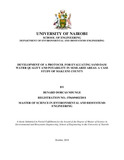| dc.description.abstract | Sand dams have been recommended in many places as a feasible technology for the ASAL areas
due to their ability to store water with minimal evaporation, recharge underground water and
raise water table, among others. In Kenya, adoption of sand dam technology has been steadily
increasing. Water from the sand dams is used for drinking, domestic uses, livestock watering,
and for irrigation. Water quality is paramount for drinking water. However, much emphasis is
being done on the sand dam technical aspects namely hydrologic measurement and analysis, and
determination of the quantity of water that will be harvested with less or no concern on the water
quality and how the water quality can be affected. There is no guideline on sand dam design
parameters, location and method of abstraction for optimal water quality. There is need to
investigate whether water from sand dams is suitable for drinking and develop a protocol to
evaluate potable water quality from sand dams.
The focus of this study was to determine water quality parameters for evaluating potability of
water from sand dams, and development of a protocol for evaluating potability of water from
sand dams in semi-arid areas. Water samples were collected from the sampled existing sand
dams’ water abstraction points within Makueni County and analyzed for heavy metals,
microbiological, physical and chemical quality.
Laboratory test results showed that all tested sand dams within the study area have unsafe water
for drinking in its raw form. A protocol for determining the potability of sand dams was
developed. The protocol provides information on how to assess the quality of raw water from
sand dams; to determine the need and extent of the water treatment to make it safe for drinking;
and to examine the resultant to ascertain that it conforms to the recommended drinking water
standards.
The study recommends that the ‘Protocol for Evaluating Potability of Water from Sand Dams’
developed during this study be adopted before any sand dam is declared to provide safe water for
drinking. It recommends that further studies on the effects of soil characteristics (within the dam
site and upstream of the dam) on water quality be done. | en_US |



